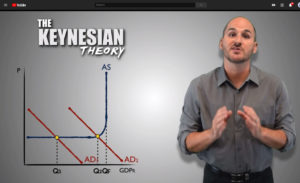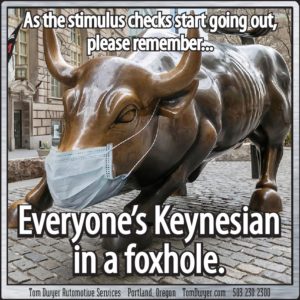Everyone’s Keynesian in a foxhole- So join us in learning what “Keynesian” means.
In the Coronavirus Crisis of 2020 states have shut down their economies with stay-home orders and Congress has already committed over 2 trillion dollars to keep our economy afloat with many more billions on the way. It wasn’t always odd for our government to swoop in to jump-start or accelerate the economy. We faced similar situations in the Great Depression and again in the Post WWII years when massive government intervention first pulled us out of a swamp and then built a Middle Class to be proud of. In economics this is “Keynesian Economics”, the polar opposite of the “Laissez Faire” economics that’s been in place since Reagan. We realized we didn’t know what “Keynesian” really meant, so we looked it up and wanted to share what we’d found. For us, it shined a light on everything the world’s been going through for decades, and very possibly, what it’s going to go through in the decades to come…
The two big economic contenders
There are (at least) two major branches to free-market economics. “Laissez Faire economics” is based on a free market where buyers and sellers can freely hire or fire, change jobs, set prices, and make purchases. If someone doesn’t like the price/wage, they can go elsewhere. At full employment, the only way to increase the GDP of a country is to increase the supply of goods for purchase… “supply side” stimulation. Through this process, the ‘invisible hand’ will draw prices and wages to a natural equilibrium. Eventually.
The problem is no market is ever ideal, and conditions change in all markets. “Keynesian economics” points out that below a certain point, people can’t afford to work or sell their products because the return they’ll get won’t support their life (not lifestyle) nor business. Laissez Faire markets work in the long run, but when the economy tanks completely an ‘eventual’ fix may not happen in the lifetime of the market participants. As John Maynard Keynes himself said, “In the long run, we’re all dead.” At times like those (and like the pandemic we’re in now) it may be necessary for the government to inject funds into the system to strengthen or even resuscitate it.
What we learned
When it comes to teaching economics we’re excellent mechanics, so we’re not even going to try to explain in any more detail ourselves. Instead, we’ll point you to some of sources we found most interesting and useful. For general background knowledge we generally start with Wikipedia or YouTube, and while Wikipedia was boring this time, we found many excellent videos.

Classical V. Keynesian Theories
by You Will Love Economics
The best was “Classical v. Keynesian Theories” by a group called You Will Love Economics. Of all the vids we watched it was by far the best. In 13:31 it explained the nuts-and-bolts of the theory clearly and elegantly, using clear graphs that conveyed the concept rather than confusing it. It was a reasoned, balanced view of the theory that didn’t swerve into ideology one way or another. We highly recommend you start here, but three others we found useful are…
Keynesian Economics and Deficit Spending Jacob Clifford
Keynesian economics, Aggregate demand and aggregate supply, Macroeconomics Khan Academy
The Keynesian Model and the Classical model, Jon Nash
This article isn’t to pontificate on whether Keynesian economics is ‘good’ or ‘bad’, but to give you a start on a fascinating subject that will affect the lives of you, your children, and your grandchildren. If it interests you too, then you’ll probably enjoy several of the sources in our “Digging Deeper” section. And if you get tired of Keynesian Theory, dig into Modern Monetary Theory… it’s even wilder!
Digging Deeper…
The Corporate Right Is Giving Us Two Choices: Go Back to Work, or Starve, Jon Schwarz in The Intercept, Apr 2020
63% Of Americans Don’t Have Enough Savings To Cover A $500 Emergency, Maggie McGrath on Forbes, Jan 2016
The U.S. Is About to Vastly Increase Its Debt. That’s a Good Thing. Neil Irwin in the NY Times, April 2020
Get ready for wartime levels of national debt and tough choices ahead, Charles Riley on CNN Business, Apr 2020
Does Keynes’s theory still hold up? Robert Skidelsky, World Economic Forum, Feb 2016
What Is Keynesian Economics? Jahan, Mahmud, and Papageorgiou, International Monetary Fund, Sep 2014
Keynesian Economics Theory- How It Works with Examples, The Balance
Trump Celebrates Legislative Win After Congress Passes $1.5 Trillion Tax Cut Bill, Arnie Seipel and Danielle Kurtzleben on NPR, Dec 2017
‘Absolutely Repulsive’: After $1.5 Trillion Tax Giveaway to the Rich, Trump Cancels Modest Pay Raise for Federal Workers, Jake Johnson on Common Dreams, Aug 2018
The Tax Bill’s Winners and Losers, Jesse Drucker and Alan Rappeport in NY Times, Dec 2017











